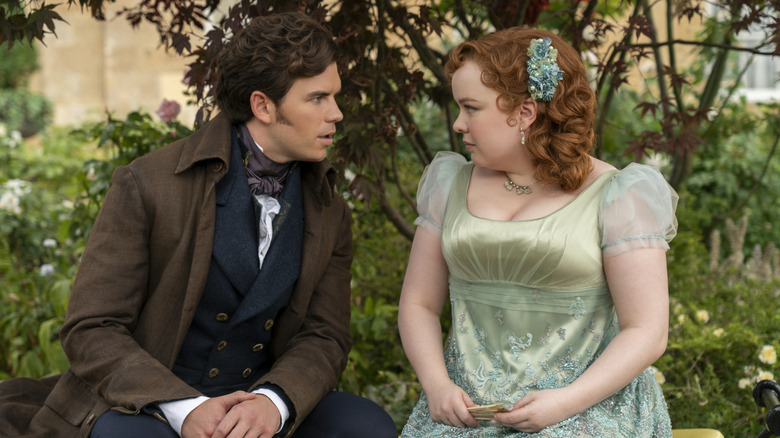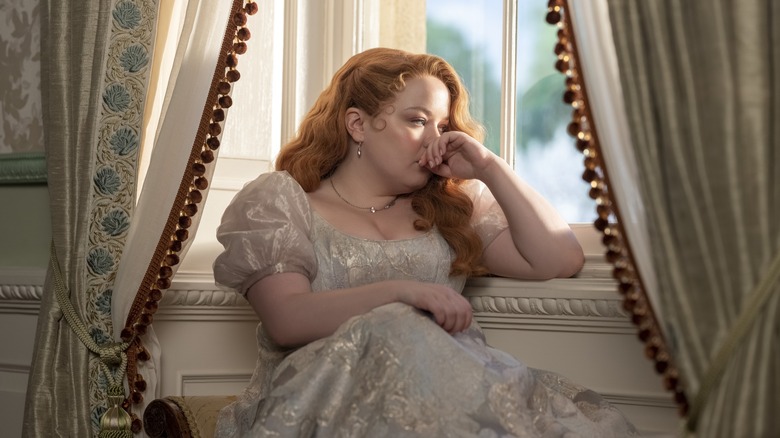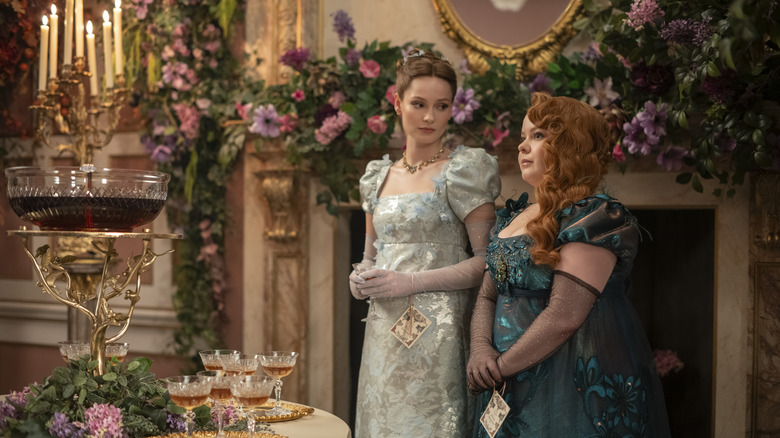Bridgerton Season 3 Review: Nicola Coughlan Is Back & Better Than Ever
- Nicola Coughlan and Luke Newton are a delight together
- Coughlan finally gets her star moment
- Francesca and Cressida (yes, really) get intriguing side arcs
- Many side characters languish
- The Lady Whistledown arc is played out
With two seasons under their belt, a third just released, and several more on the horizon, "Bridgerton" has become one of Netflix's surest bets when it comes to reliable programming — we're just along for the ride at this point. The scintillating drama full of swoon-worthy period romance returns with its newest outing, this time focused on the exploits of the third Bridgerton son, Colin (Luke Newton), and Lady Whistledown herself, Penelope Featherington (Nicola Coughlan). Although both actors are more than capable of bringing steaminess and vivacity to their roles (and whatever glow-up boot camp the Shondaland machine sends its stars to needs to be studied in a lab, because seriously, wow), the third season isn't quite as satisfying as its two predecessors. It certainly has enough heat to keep the "Bridgerton" train chugging along, but it won't likely be remembered as its strongest outing.
After Season 2, Colin has gone on yet another European journey to find himself, still emotionally recovering from his failed relationship with Marina Thompson (Ruby Barker). Meanwhile, Penelope finds herself adrift, since the private revelation that she is Lady Whistledown means that her best friend Eloise (Claudia Jessie) is no longer speaking to her. But Penelope might just have bigger fish to fry.
When it becomes clear that the Featherington fortune will go to the first of the family's daughters to produce a male heir, Penelope realizes that she might be doomed to spend her life under the heel of someone worse than her mother — her vexatious sisters — and she becomes determined to marry. But while she hopes merely to find a respectable match that will allow her to live in peace, she finds herself turning to an unexpected Bridgerton head that she had long since written off as a hopeless crush. Will her career as the notorious Lady Whistledown throw a wrench into her happily ever after?
Can Colin and Penelope overcome Lady Whistledown?
Colin and Penelope are an incredibly likable duo — it's hard not to want the best for both of them. Luke Newton puts in a mature performance that allows him to step out of the limelight of his two older on-screen brothers, and Nicola Coughlan takes Penelope and allows her to blossom in a way that it's almost difficult to believe that she's the same person. What's most impressive — and refreshing — is that the production team doesn't go down the well-trodden path of having her lose weight so that she can suddenly be worthy of love. Penelope simply comes into her own, and that alone allows her to become the belle of the ball.
Intellectually, we want these two to wind up together. But there are one or two aspects of their relationship that make it a little less satisfying — and yes, less steamy — than we saw in the first two seasons. First, Penelope and Colin are two introspective characters, with a tendency to be in their own heads a lot of the time. So when their relationship finally develops into something a little more carnal, you can see them thinking their way through it ... a lot. Penelope's vulnerability as she takes this giant step is incredibly poignant, and their romance certainly benefits from these quieter moments, but fans of the tawdry romance novels that inspired the "Bridgerton" series may find themselves a little disappointed. The other issue we have is that throughout the third season of "Bridgerton," we've been sold a bill of goods that this is the friends-to-lovers trope. Except that this friendship has always been more than a little one-sided — we've seen plenty of evidence of Penelope being a friend to Colin over the years, but not so much the other way around. He's always said what a good friend she is to him, but this whole arc would have been more rewarding if we had seen a genuine, mutual friendship between the two more often.
It's also hard to ignore the specter of Lady Whistledown weighing over the entire production. "Bridgerton" reminds us over and over again of the animosity between the Bridgertons and the prolific gossip-monger, so it's occasionally difficult to enjoy their romance knowing that they have such a dramatic conflict hanging over their heads, just waiting to fall. And to be entirely honest, they've written themselves into such a corner with Whistledown that many audiences may not feel that their relationship should survive it. Furthermore, going into the third season, the Whistledown obsession feels played out, and it's frustrating that it's still getting so much screen time, holding back other characters who really should be moving on to other things. This is the first time where it feels like so many of the characters have little else to do than bide their time until they get their own season. It's clear that the writers don't know what to do with Benedict (Luke Thompson) and Eloise (Claudia Jessie), who continue to tread water, their character development stuck in a narrative quicksand.
Francesca and Cressida shine in the background
But that isn't to say there aren't plenty of pleasant surprises in the season, especially from background characters who have been given expanded roles. Francesca (Hannah Dodd) is a fascinating character, so different from the other Bridgertons that even they struggle to understand what goes on in her mind. She's unconventional without being quirky, which is a good choice for the show, since Eloise has already filled that role. Or rather, she's unconventional for the Bridgerton clan, who all seem either determined to make a love match or are steadfastly devoted to the idea of marrying (up until the very minute that they meet their season's romantic interest, that is). Francesca just wants a quiet, pleasant life, and doesn't crave the passion that her older siblings have for their spouses. (We'll have to wait until her season to see how this all plays out.)
The characterization of Cressida Cowper (Jessica Madsen) is also one of the more intriguing elements of this new season, as she goes from stock villain to a living, breathing — if still annoying — person whose motivations we can finally understand. As Eloise befriends her in the absence of Penelope, we're given a glimpse of a young woman who is pressured by her father into finding a husband by any means necessary, or he will find one for her. She may still be a self-centered gossip, but she's also a surprisingly good friend to Eloise, even when Eloise doesn't always deserve it. Adding this richness of character — not turning her into a saint, but giving her enough development to keep her interesting — is an example of why "Bridgerton" has succeeded where other period romances have failed to hold the attention of viewers beyond the lead couple.
All that said, at the end of the day the reason people like "Bridgerton" is because it's, well ... "Bridgerton." They've fallen in love with the characters and are emotionally invested in seeing how their stories unfold. That's the biggest hurdle for any drama series. As far as the third season of "Bridgerton," it's good but not great, yet it accomplishes the two things it really needed to do. One, it's a strong enough entry to keep the series going (hopefully through the romances of each "Bridgerton" sibling, if Netflix knows what's good for them). And secondly, this should be the season that makes Nicola Coughlan the bonafide star she deserves to be — we've been waiting since "Derry Girls" for her to get her day in the sun.
The first four episodes of "Bridgerton" Season 3 premiere on Netflix on May 16, with the following four premiering on June 13.


